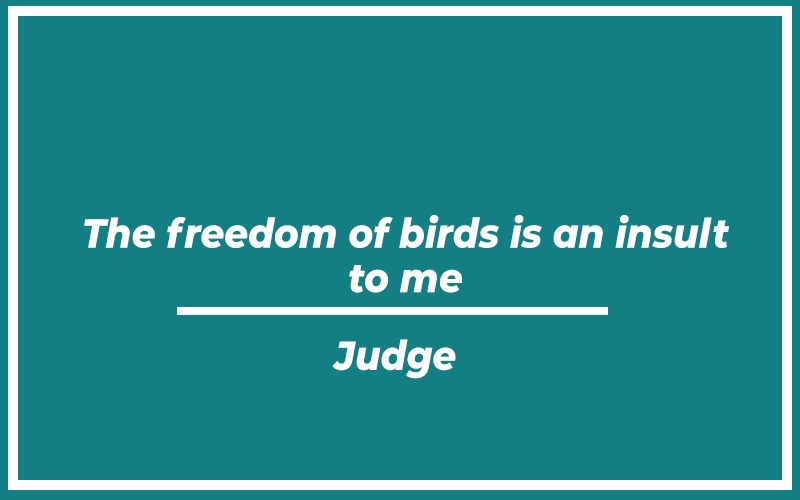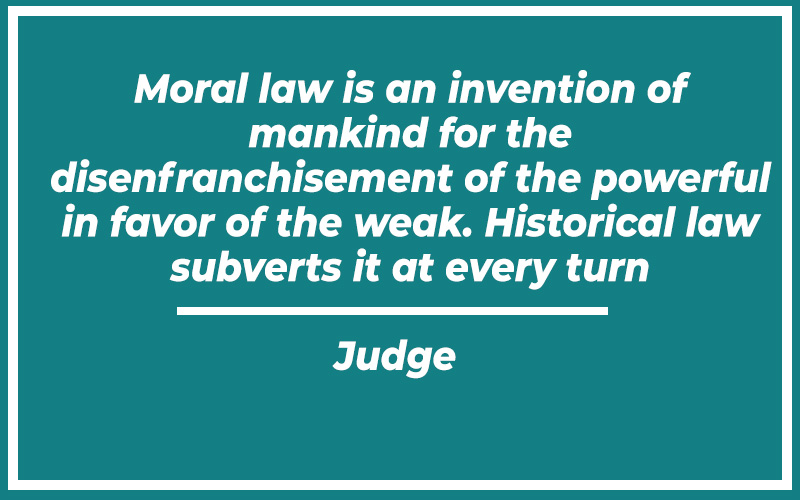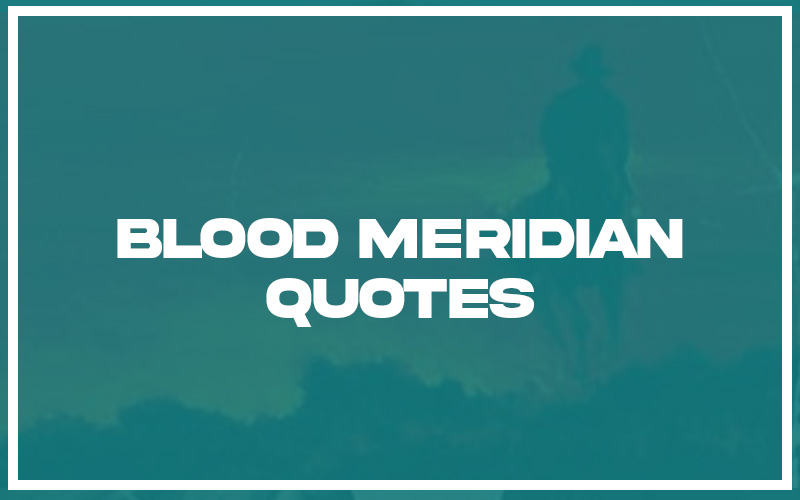Cormac McCarthy’s “Blood Meridian,” a neo-Western novel that is set against the backdrop of the American frontier. The story follows a young man who joins a group of scalp hunters during the brutal US-Mexico border conflicts of the mid-19th century.
If you’re a fan of Westerns with depth and a touch of philosophical inquiry, then you will definitely enjoy these quotes from “Blood Meridian.”
Blood Meridian Quotes
“The universe is no narrow thing and the order within it is not constrained by any latitude in its conception to repeat what exists in one part in any other part. Even in this world more things exist without our knowledge than with it and the order in creation which you see is that which you have put there, like a string in a maze, so that you shall not lose your way.” – Judge
The Judge’s philosophical reflection in Blood Meridian emphasizes the vastness and complexity of the universe. His words suggest that human understanding is limited and that there are countless phenomena beyond our comprehension.
The analogy of a maze implies that the order we perceive is merely a construct of our minds, a simplification of reality to prevent us from feeling lost. McCarthy uses the Judge to challenge the reader’s perception of order and chaos, inviting contemplation on the nature of existence.

“Whatever in creation exists without my knowledge exists without my consent.” – Judge
This chilling declaration by the Judge underscores his megalomaniacal worldview in Blood Meridian. It reflects his belief in total control and dominance over the natural world. The quote highlights the Judge’s arrogance and disregard for anything beyond his understanding or influence.
McCarthy employs the Judge to personify the destructive forces of human ambition and unchecked power, serving as a reminder of the potential consequences of such unchecked authority.
“It makes no difference what men think of war, said the judge. War endures. As well ask men what they think of stone. War was always here. Before man was, war waited for him. The ultimate trade awaiting its ultimate practitioner. That is the way it was and will be. That way and not some other way.” – Judge
In this passage from Blood Meridian, the Judge presents war as an eternal, primal force inherent to human existence. His assertion that war predates humanity itself suggests that it is an inescapable aspect of the human condition.
McCarthy uses the Judge’s words to convey a sense of fatalism, implying that war is an immutable feature of the universe. The quote serves as a bleak commentary on the cyclical nature of violence and conflict throughout history.
“Whatever in creation exists without my knowledge exists without my consent.” – Judge
This chilling declaration by the Judge underscores his megalomaniacal worldview in Blood Meridian. It reflects his belief in total control and dominance over the natural world. The quote highlights the Judge’s arrogance and disregard for anything beyond his understanding or influence.
McCarthy employs the Judge to personify the destructive forces of human ambition and unchecked power, serving as a reminder of the potential consequences of such unchecked authority.
“It makes no difference what men think of war, said the judge. War endures. As well ask men what they think of stone. War was always here. Before man was, war waited for him. The ultimate trade awaiting its ultimate practitioner. That is the way it was and will be. That way and not some other way.” – Judge
In this passage from Blood Meridian, the Judge presents war as an eternal, primal force inherent to human existence. His assertion that war predates humanity itself suggests that it is an inescapable aspect of the human condition.
McCarthy uses the Judge’s words to convey a sense of fatalism, implying that war is an immutable feature of the universe. The quote serves as a bleak commentary on the cyclical nature of violence and conflict throughout history.
“Whatever in creation exists without my knowledge exists without my consent.” – Judge
This chilling declaration by the Judge underscores his megalomaniacal worldview in Blood Meridian. It reflects his belief in total control and dominance over the natural world. The quote highlights the Judge’s arrogance and disregard for anything beyond his understanding or influence.
McCarthy employs the Judge to personify the destructive forces of human ambition and unchecked power, serving as a reminder of the potential consequences of such unchecked authority.
“It makes no difference what men think of war, said the judge. War endures. As well ask men what they think of stone. War was always here. Before man was, war waited for him. The ultimate trade awaiting its ultimate practitioner. That is the way it was and will be. That way and not some other way.” – Judge
In this passage from Blood Meridian, the Judge presents war as an eternal, primal force inherent to human existence. His assertion that war predates humanity itself suggests that it is an inescapable aspect of the human condition.
McCarthy uses the Judge’s words to convey a sense of fatalism, implying that war is an immutable feature of the universe. The quote serves as a bleak commentary on the cyclical nature of violence and conflict throughout history.
“You aint no kinda man if you ain’t ever been to no cow camp.” – Toadvine
Toadvine’s assertion in Blood Meridian reflects the rugged, frontier ethos of the characters in the novel. It suggests that one’s worth as a man is determined by experiences in harsh, wild environments like cow camps.
McCarthy uses this quote to emphasize the importance of toughness and resilience in the unforgiving landscape of the American West. Toadvine’s words serve as a reminder of the harsh realities faced by those living on the frontier, where strength and survival skills are paramount.
“It makes no difference what men think of war, said the judge. War endures. As well ask men what they think of stone. War was always here. Before man was, war waited for him. The ultimate trade awaiting its ultimate practitioner. That is the way it was and will be. That way and not some other way.” – Judge
The Judge’s grim pronouncement in Blood Meridian underscores the novel’s theme of violence as an intrinsic aspect of human existence. His comparison of war to an enduring force like stone suggests its permanence in the fabric of reality.
McCarthy employs the Judge to convey a sense of fatalism, implying that humanity’s propensity for conflict is immutable. The quote serves as a stark commentary on the cyclical nature of war throughout history, challenging notions of progress and civilization.
“It makes no difference what men think of war, said the judge. War endures. As well ask men what they think of stone. War was always here. Before man was, war waited for him. The ultimate trade awaiting its ultimate practitioner. That is the way it was and will be. That way and not some other way.” – Judge
In this passage from Blood Meridian, the Judge presents war as an eternal, primal force inherent to human existence. His assertion that war predates humanity itself suggests that it is an inescapable aspect of the human condition.
McCarthy uses the Judge’s words to convey a sense of fatalism, implying that war is an immutable feature of the universe. The quote serves as a bleak commentary on the cyclical nature of violence and conflict throughout history.
“It makes no difference what men think of war, said the judge. War endures. As well ask men what they think of stone. War was always here. Before man was, war waited for him. The ultimate trade awaiting its ultimate practitioner. That is the way it was and will be. That way and not some other way.” – Judge
The Judge’s grim pronouncement in Blood Meridian underscores the novel’s theme of violence as an intrinsic aspect of human existence. His comparison of war to an enduring force like stone suggests its permanence in the fabric of reality.
McCarthy employs the Judge to convey a sense of fatalism, implying that humanity’s propensity for conflict is immutable. The quote serves as a stark commentary on the cyclical nature of war throughout history, challenging notions of progress and civilization.
“You aint no kinda man if you ain’t ever been to no cow camp.” – Toadvine
Toadvine’s assertion in Blood Meridian reflects the rugged, frontier ethos of the characters in the novel. It suggests that one’s worth as a man is determined by experiences in harsh, wild environments like cow camps.
McCarthy uses this quote to emphasize the importance of toughness and resilience in the unforgiving landscape of the American West. Toadvine’s words serve as a reminder of the harsh realities faced by those living on the frontier, where strength and survival skills are paramount.
“You aint no kinda man if you ain’t ever been to no cow camp.” – Toadvine
Toadvine’s assertion in Blood Meridian reflects the rugged, frontier ethos of the characters in the novel. It suggests that one’s worth as a man is determined by experiences in harsh, wild environments like cow camps.
McCarthy uses this quote to emphasize the importance of toughness and resilience in the unforgiving landscape of the American West. Toadvine’s words serve as a reminder of the harsh realities faced by those living on the frontier, where strength and survival skills are paramount.
Also Read: Top Mafia Quotes (with Commentary)
“War is god.” – Judge
The Judge’s stark proclamation in Blood Meridian encapsulates the novel’s exploration of the dehumanizing nature of violence. By equating war with divinity, the Judge presents conflict as a central, almost sacred aspect of human existence.
McCarthy employs this quote to underscore the characters’ relentless pursuit of warfare and the brutality that ensues. The statement serves as a chilling commentary on the destructive power of human ambition and the moral ambiguity inherent in the quest for dominance.

“The freedom of birds is an insult to me.” – Judge
In this chilling assertion from Blood Meridian, the Judge reveals his disdain for the natural world and its inhabitants. His resentment towards the freedom of birds reflects his megalomaniacal desire for total control and dominance.
McCarthy employs this quote to highlight the Judge’s nihilistic worldview and his belief in the superiority of human intellect over nature. The statement serves as a disturbing commentary on the consequences of unchecked human arrogance and the disregard for the sanctity of life.
“You can find meanness in the least of creatures, but when God made man the devil was at his elbow. A creature that can do anything. Make a machine. And a machine to make the machine. And evil that can run itself a thousand years, no need to tend it.” – Judge
The Judge’s cynical reflection in Blood Meridian explores the capacity for malevolence inherent in humanity. His comparison of man to a machine capable of perpetuating evil autonomously underscores the novel’s themes of moral ambiguity and existential dread.
McCarthy employs this quote to challenge conventional notions of good and evil, suggesting that humanity’s greatest threat lies within itself. The statement serves as a sobering commentary on the potential for unchecked human ambition to unleash untold suffering and destruction.
“Moral law is an invention of mankind for the disenfranchisement of the powerful in favor of the weak. Historical law subverts it at every turn.” – Judge
The Judge’s cynical assessment of moral and historical law in Blood Meridian reflects his nihilistic worldview and rejection of societal norms. His assertion that moral law serves to empower the weak at the expense of the powerful challenges conventional notions of justice and morality.
McCarthy employs this quote to underscore the Judge’s belief in the inherent amorality of the universe and the futility of human attempts to impose order. The statement serves as a bleak commentary on the inevitability of chaos and violence in the face of human ambition.
“The freedom of birds is an insult to me.” – Judge
In this chilling assertion from Blood Meridian, the Judge reveals his disdain for the natural world and its inhabitants. His resentment towards the freedom of birds reflects his megalomaniacal desire for total control and dominance.
McCarthy employs this quote to highlight the Judge’s nihilistic worldview and his belief in the superiority of human intellect over nature. The statement serves as a disturbing commentary on the consequences of unchecked human arrogance and the disregard for the sanctity of life.
“You can find meanness in the least of creatures, but when God made man the devil was at his elbow. A creature that can do anything. Make a machine. And a machine to make the machine. And evil that can run itself a thousand years, no need to tend it.” – Judge
The Judge’s cynical reflection in Blood Meridian explores the capacity for malevolence inherent in humanity. His comparison of man to a machine capable of perpetuating evil autonomously underscores the novel’s themes of moral ambiguity and existential dread.
McCarthy employs this quote to challenge conventional notions of good and evil, suggesting that humanity’s greatest threat lies within itself. The statement serves as a sobering commentary on the potential for unchecked human ambition to unleash untold suffering and destruction.
“Whatever exists, he said. Whatever in creation exists without my knowledge exists without my consent.” – Judge
The Judge’s assertion in Blood Meridian reflects his megalomaniacal belief in total control and dominance. By claiming authority over all existence, he epitomizes the novel’s exploration of unchecked power and its consequences.
McCarthy employs this quote to underscore the Judge’s terrifying worldview and his disregard for anything beyond his understanding. It serves as a chilling commentary on the dangers of absolute authority and the hubris of those who seek to wield it.
“He never sleeps, the judge. He is dancing, dancing. He says that he will never die.” – Kid
The Kid’s haunting observation in Blood Meridian captures the enigmatic and seemingly immortal nature of the Judge. His relentless pursuit of violence and chaos defies conventional notions of mortality, embodying the novel’s themes of existential dread and moral ambiguity.
McCarthy employs this quote to highlight the Judge’s larger-than-life presence and his role as a symbol of humanity’s darkest impulses. It serves as a chilling commentary on the cyclical nature of violence and the haunting specter of eternal damnation.
“Moral law is an invention of mankind for the disenfranchisement of the powerful in favor of the weak. Historical law subverts it at every turn.” – Judge
The Judge’s cynical assessment of moral and historical law in Blood Meridian reflects his nihilistic worldview and rejection of societal norms. His assertion that moral law serves to empower the weak challenges conventional notions of justice and morality.
McCarthy employs this quote to underscore the Judge’s belief in the inherent amorality of the universe and the futility of human attempts to impose order. It serves as a bleak commentary on the inevitability of chaos and violence in the face of human ambition.
“He never sleeps, the judge. He is dancing, dancing. He says that he will never die.” – Kid
The Kid’s haunting observation in Blood Meridian captures the enigmatic and seemingly immortal nature of the Judge. His relentless pursuit of violence and chaos defies conventional notions of mortality, embodying the novel’s themes of existential dread and moral ambiguity.
McCarthy employs this quote to highlight the Judge’s larger-than-life presence and his role as a symbol of humanity’s darkest impulses. It serves as a chilling commentary on the cyclical nature of violence and the haunting specter of eternal damnation.

“Moral law is an invention of mankind for the disenfranchisement of the powerful in favor of the weak. Historical law subverts it at every turn.” – Judge
The Judge’s cynical assessment of moral and historical law in Blood Meridian reflects his nihilistic worldview and rejection of societal norms. His assertion that moral law serves to empower the weak challenges conventional notions of justice and morality.
McCarthy employs this quote to underscore the Judge’s belief in the inherent amorality of the universe and the futility of human attempts to impose order. It serves as a bleak commentary on the inevitability of chaos and violence in the face of human ambition.
Also Read: Top Mafia Quotes (with Commentary)
Final Thoughts
These quotes are a powerful exploration of violence, morality, and the human condition that are prevalent themes in “Blood Meridian.”
From pondering the nature of war to questioning the meaning of existence, this book helps to understand the capacity for good and evil and how conflict, just like fire, is quick to blow out of proportion and destroy everything around it.

